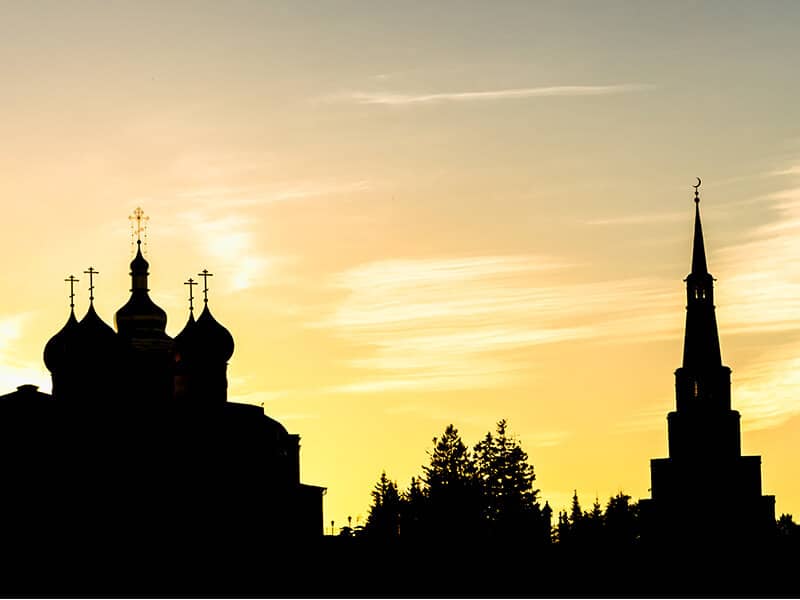Moreover, Abdul Hadi Palazzi told an interfaith meeting here Monday, Jews and Muslims could feasibly find ways to ``share'' the hilltop compound religiously if both sides actively sought cooperation rather than conflict.
His comments echoed those of some 100 liberal American rabbis who declared in December that Judaism does not demand exclusive Jewish sovereignty over the Temple Mount.
Palazzi made his comments during an interfaith meeting seeking to defuse tensions over control of the site, one of the chief sticking points blocking an Israeli-Palestinian peace settlement. The al-Aqsa compound has become a flashpoint in the ongoing clashes between Palestinians and Israelis, particularly since Israeli politician Ariel Sharon visited the site in September. Ongoing violence has followed ever since his visit.
``It is shocking to hear a mufti say that there was never a temple there,'' Palazzi said. He was referring to recent comments by Jerusalem Mufti Sheikh Ekrima El Sabri in which he said ``there is not even the smallest indication of the existence of a Jewish temple on this place in the past. In the whole city (of Jerusalem) there is not even a single stone indicating Jewish history.''
``Saying such a thing doesn't just contradict the Bible, it contradicts the Koran,'' said Palazzi, a lecturer at Italy's University of Velletri and a graduate of Egypt's famed al-Azhar Islamic University.
Palazzi also condemned the conduct of recent underground excavations by Muslims inside the mosque compound, terming it a ``destruction of everyone's patrimony.''
Medieval Islamic commentators openly affirmed that the historic roots of the Islamic attachment to the al-Aqsa site lay in Judaism and Christianity, whose prophets Islam also recognized, Palazzi said.
``Denying the role of Jerusalem in Judaism is also denying its role in Islam,'' Palazzi said. ``If we deny the role Jerusalem played in the stories of the biblical prophets, then we are also denying the role of these prophets in Islamic scripture.''
``When the Muslim Caliph Omar conquered Jerusalem (in 638 A.D.), a ban on the entry of Jews to the city had been enforced for six centuries, from the time of the Roman Emperor Hadrian to the Byzantine period,'' he said.
``This was regarded as unbearable by Omar, who ordered that 70 Jewish families from Tiberias should be relocated to the holy city and settled in the southwest quarter of the area bordering the Temple Mount, exactly the same area as the Jewish quarter today.''
Palazzi blamed the current conflict over the mount and mosque site on what he called the ``politicization'' of Islam over the past century.
And he said he saw no reason why Jews couldn't be permitted to pray on the mount, in coordination with Muslim authorities, or ultimately even to build another temple alongside the existing Islamic structures.
``I have heard some rabbis say that when a third temple is built, it will be built with everyone cooperating, and no one opposing,'' he said.
``If the issue is used to perpetuate the conflict, then there won't be a solution. But if it is understood that the presence of a temple close to the mosque is something that enriches both religions, when this mentality is present, finding a practical solution is not difficult," Palazzi said.
Speaking in an Israeli television interview on Monday, Palestinian President Yasser Arafat said he recognized Jewish rights to pray only at the Western Wall of the Temple Mount -- which is adjacent to but outside the Temple Mount and the al-Aqsa Mosque compound -- which for centuries has been a traditional place of Jewish prayer.
``I respect this. I respect this completely,'' Arafat said referring to Jewish prayer rights at the Wall, which Jews believe to be a remnant of the Temple retaining walls.
Arafat also noted that as a child he had spent ``hours there, watching Jews pray,'' while waiting to meet his uncle, with whom he was living at the time in Jerusalem's walled Old City.
Arafat's comments seemed intended to strike a conciliatory note following Sabri's remarks.
In a separate Israeli television interview Monday, however, Egyptian President Hosni Mubarak also warned Israel against seeking Jewish access into the mosque compound.
Israel should stop ``complicating things'' by talking about claims ``above the Haram and below the Haram,'' Mubarak said, using the Arabic word for the entire mosque compound.

